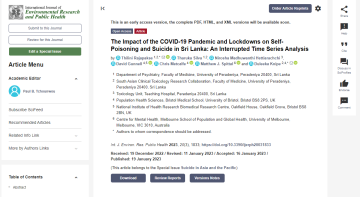Sri Lankan suicide rate stable during pandemic
- 19 January 2023
Sri Lankan suicide rates did not increase during the pandemic, according to the results of a study published in the International Journal of Environmental Research and Public Health, funded by Bristol’s BRC, the Elizabeth Blackwell Institute for Health Research and the Centre for Pesticide Suicide Prevention at the University of Edinburgh. However, the study team found that fewer people presented to and were admitted into hospital because of self-poisoning during lockdowns.
Previous studies have gathered evidence about the impact of COVID-19 on suicide rates from largely high-income countries. The study team wanted to address this lack of evidence by looking at data from Sri Lanka, as it has one of the few self-harm registers in a lower- and middle-income country. The team also analysed the country’s national suicide records.
They found that, during lockdowns, fewer people presented to and were admitted into hospital because of self-poisoning. In fact, admissions because of self-poisoning were lower throughout the pandemic, when compared with pre-pandemic rates. This was the case regardless of sex, age or method of poisoning.
The study team also found that the rate of suicide in Sri Lanka hadn’t increased during the pandemic. The number of deaths from suicide followed established national trends, despite the substantial disruption caused by COVID-19. Independent of the pandemic, the rate for almost all methods of suicide (including pesticide) has been decreasing, except for suicide deaths by hanging.
Many countries around the world reported a reduction in the number of people presenting to hospital due to self-harm at the start of the pandemic. The study team saw this reflected in the smaller number of Sri Lankans presenting to hospitals because of self-poisoning.
Social isolation, financial strain and fears of contracting the virus itself have been linked to increased symptoms of anxiety, depression and suicidal thoughts internationally. The study team didn’t find any evidence to suggest that this global trend resulted in an increase of suicide or self-poisoning in Sri Lanka.
Dr Duleeka Knipe, co-lead of the research team, said:
“We often say that suicide and self-harm are different behaviours in low- and middle-income compared to high-income countries and we do find that this is the case in most of our research. However, this study reinforces what we have seen in other parts of the world, that suicide and self-harm behaviour has not increased.
“Similarly to other low- and middle-income countries, Sri Lanka is facing an unprecedented economic crisis in the wake of the pandemic. Poverty, unemployment and other risk factors for self-harm and suicide are on the rise.
“The period in this study does not capture the timepoints when Sri Lanka reached its peak in terms of economic crisis (2022) and so we must remain vigilant and continue to monitor the impact these have. The situation might change quickly, and we must be ready to act.”
Professor Michael Eddleston, Director of the Centre for Pesticide Suicide Prevention, said:
“Sri Lanka once had one of the highest suicide rates in the world, largely due to instances of pesticide self-poisoning. Since restrictions were introduced on toxic pesticides in the 1990’s, there has been a staggering 70% drop in the overall suicide rate.
“The findings of this study are therefore encouraging, indicating that this downward trend in self-poisoning has continued throughout the pandemic.”
